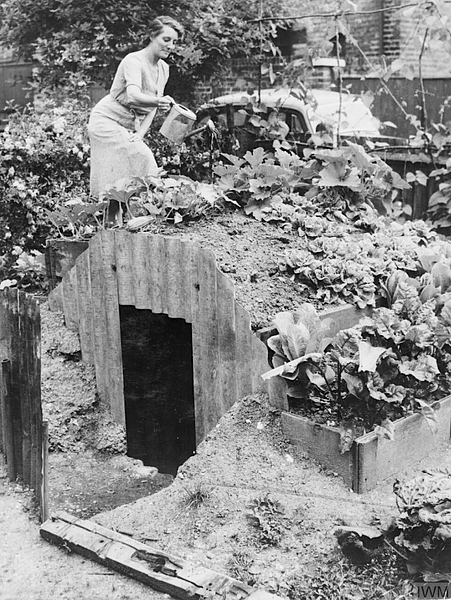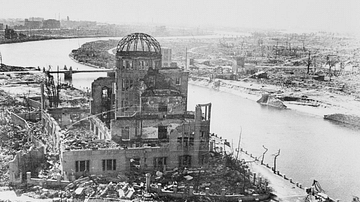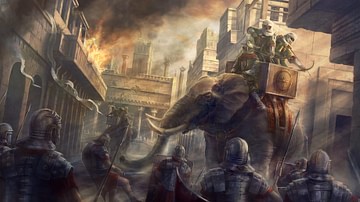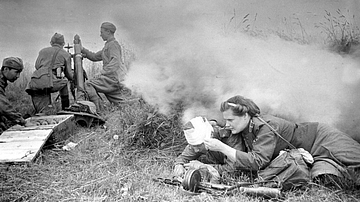
The Phoney War was the period from the start of the Second World War (1939-45) when Britain and France declared war against Germany on 3 September until the start of significant military action in the West in the spring of 1940. While Poland bore the brunt of Germany's aggression, the civilians of Western Europe anxiously awaited their turn.
Hitler Invades Poland
Adolf Hitler (1889-1945), the leader of Nazi Germany, had pursued a persistently aggressive foreign policy through the 1930s by breaking the restrictions imposed by the Treaty of Versailles, which had formally concluded the First World War (1914-18), forming the Anschluss, or union, with Austria and occupying the Czech Sudetenland in 1938. Powers like Britain and France, fearing the terrible costs of another world war, had opted for a policy of appeasement towards Hitler, but they finally took a stand after Hitler's occupation of Czechoslovakia in March 1939 when the Nazi leader next threatened Poland. Britain and France promised to protect the Poland in the event of an attack, and so the invasion of Poland in 1939 resulted in both countries declaring war on Hitler if he did not withdraw. This declaration was made on 3 September, but Hitler did not respond and carried on with his invasion plan, carving up Poland with the USSR, as had been agreed in the Nazi-Soviet Pact the month before.
In practical reality, given the geographic distances involved, both Britain and France could do little to help the Polish government in terms of military aid – one of the main reasons Hitler had believed his invasion would not lead to WWII. Meanwhile, the USA pursued an isolationist policy, and Italy, for the time being, remained neutral. Perhaps if France had mobilised its army and attacked Germany from the west, then Hitler may have withdrawn, but the French generals had already put their faith not in offence but in defence. Britain did nothing practical either, as Member of Parliament Robert Boothby (1900-1986) noted: "We'd gone to war for the defence of Poland, we'd given a unilateral guarantee to Poland and in the event we did nothing to help Poland at all" (Holmes, 74).
While the Poles bore the full brunt of Germany's high-speed blitzkrieg war tactics, it was not until the spring of 1940 that the people of Western Europe became directly involved in the war. This initial period of non-military action in the West, when everyone expected the bombs, artillery fire, and tanks to arrive at any moment, was called the Phoney War. The term was coined by a US newspaper. Some of the British press described the period as the 'Bore War' while Prime Minister Neville Chamberlain (1869-1940) called it the 'Twilight War'. In France, the same period was called la drôle de guerre ('Strange War'), while in Germany it was the Sitzkrieg ('Sitting War').

France
The French government did use the Phoney War to increase rearmament:
In the first six months of 1940, Anglo-French factories produced 1,412 tanks compared with German production of 558. The chaos of French aircraft production was being improved and brought Anglo-French aircraft production to 6,794, double that of Germany.
(Deighton, 171-2)
In the field, the French army made only the most tentative military moves on Germany, despite the fact that French artillery could easily fire into Germany without leaving the Maginot defensive line. The Maginot Line, named after the French minister of war André Maginot, was a massive line of static defences consisting of bunkers, fortifications, heavy guns, and underground tunnels, which, it was hoped, protected France's border with Germany. A probe around Saarbrücken was as far as the French army got regarding any meaningful military engagement with the enemy. Rather, after rejecting such wild schemes to fight Germany in faraway places like the oil fields of the Caucasus, the French high command was content to sit behind what it considered the impregnable Maginot defences, which were now manned by a formidable force of 400,000 well-trained soldiers. As it happened, the German generals bypassed the Maginot Line by attacking through the Ardennes and Sedan regions on the Belgian border, terrain thought entirely unsuitable for tanks. France's gamble on defence proved to be folly.
Britain
The British Expeditionary Force (BEF), which consisted of some 150,000 men and 12 Royal Air Force (RAF) squadrons, was present in Continental Europe during the Phoney War but did little more than conduct patrols around the Belgian border area. The BEF was boosted by the spring of 1940 to around 400,000 men, but these were still mostly infantry, and so the army lacked the tanks essential to meet the enemy's highly mechanised force. As with France's army, Britain equipped the BEF as a defensive force, not an offensive one. Essentially, the British government hoped that the BEF would hold the status quo while the French army and their Maginot Line gave time for rearmament to continue apace. It was also hoped that a naval blockade of Germany would so reduce its resources that Hitler would delay or even abandon an attack in the West. Again, these hopes were soon to be utterly dashed.

The British government, especially while still led by Neville Chamberlain (prime minister from May 1937 to May 1940), was particularly concerned with air attacks. While the RAF could strike at Germany, the government was all too aware that there would then follow revenge attacks, perhaps on British cities, and not merely military targets. There were, too, still some scruples as to what constituted legitimate targets; in an official report, the German ammunition factory at Essen was considered out of bounds since it was "private property". There was a bombing raid on some naval ships at Wilhelmshaven since this attack was not considered as impolite as hitting targets on land. These niceties would be swept away once the conflict started in earnest, but during the Phoney War, there was still much naive hope that everything would be sorted out through diplomacy, and before heavy blows became necessary. One voice in favour of more aggressive conduct of the war was Winston Churchill (1874-1965), then first lord of the Admiralty. Churchill advocated dropping mines into the Rhine, but the French government vetoed the plan.
At least armament production was gathering pace, as noted above, and Britain's air defences and network of radar stations, what would become known as the Dowding System, were all greatly improved. Heavily reliant on volunteers, the Air Raid Wardens' Service had recruited 750,000 air raid wardens by September 1939. In anticipation of bombing raids, Britain's fire service was expanded so that it boasted 75,000 members, 85% of whom were auxiliaries. Similarly, the Women's Voluntary Service for Civil Defence had gained 300,000 volunteers by 1939.
Hitler seemed equally cautious in starting an air war with Britain. The Luftwaffe (German air force) was given the green light to bomb about as remote a target as they could find, the Shetland Islands, which were hit on 13 November 1939. Hitler knew full well that his armed forces were still some way behind those of Britain and France, so any delay in engaging with them was welcome and allowed him to concentrate on Poland. For these reasons, the first British military service casualties in France did not come until December 1939.

It was at sea that Britain took the fight to Germany. One of the first attacks on British shipping was in the waters off the Scottish Hebrides on the liner Athenia. The 13,500-ton ship was struck on 3 September by a torpedo fired by a U-boat submarine. 128 people died in the incident. The Royal Navy then lost the battleship HMS Royal Oak in October, again to a U-boat. Revenge was gained at the Battle of the River Plate in South America in December where the German captain of the pocket battleship Admiral Graf Spee was outwitted into scuttling his ship.
The Civilian View
Civilians in Britain may have been relieved that they remained unaffected by the fighting going on elsewhere, but there were plenty of annoyances to cope with. The British government insisted lights went out at night – the blackout – to prevent enemy aircraft being given easy targets. With no street lights and vehicles obliged to use only dimmed lights, there were thousands of accidents during the blackout, many of them fatal. Places of entertainment like theatres, cinemas, and music halls were temporarily closed, and when they reopened, audience capacities were reduced as a precaution against a direct hit by a bomb. The same restrictions were applied to sports stadiums. Hospitals were emptied of all but the most necessary patients to make way for what was imagined would be a tidal wave of war casualties. Air raid shelters popped up everywhere, most of them poorly built. Children (aged 5 to 14, the school-leaving age at the time) were separated from their parents as the government encouraged a system of evacuation to safer rural areas. The evacuation of children in wartime Britain split families and often caused trauma, but the scheme, despite a brief reversal as the Phoney War dragged on and parents became sceptical of its necessity, eventually involved 6 million women and children.
As the government feared the threat to merchant shipping and the nation's vital supply routes, the Phoney War witnessed rationing. Rationing in wartime Britain involved restrictions on the quantity of non-staple foodstuffs, fuel, and clothing people could buy. There were many other rules people had to follow as "more emergency laws were passed in the first two weeks of the war than had been passed in the first year of the First World War" (Dear, 691). Windows were taped to prevent bomb-shattered glass from flying everywhere, and road signs were removed so as not to aid enemy parachutists. People were encouraged to carry gas masks at all times, to grow their own vegetables, and to learn the silhouettes of enemy aircraft so they could accurately report sightings to the authorities. Government ministries began to issue propaganda posters demonising the enemy and warning civilians of careless talk and squandering vital materials.

As the Phoney War dragged on and without any bombs actually falling, people began to see the restrictions as unnecessary irritations. The bombing would come soon enough. The first British civilian casualty was killed during a bombing raid on Scapa Flow, the naval base in the Orkneys, on 16 March 1940. The devastating London Blitz, with its almost nightly raids, began in September 1940 and lasted until May 1941.
The War Begins in the West
WWII began in Western Europe in the spring of 1940 when, after a bout of bad weather, which had further delayed Hitler's plans, had passed, the German army occupied Denmark and then attacked Norway on 9 April. Next came the turn of the Netherlands, Belgium, and France to face Germany's blitzkrieg tactics where tanks, artillery, infantry, and aircraft were used together at speed to overwhelm the enemy. So quick was the collapse of the French defences that the BEF was obliged to make a hasty retreat to Britain with the Dunkirk Evacuation (10 July to 31 October 1940). Paris was occupied on 14 June. The French government surrendered on 22 June. The Fall of France had come in a matter of weeks. The British people now feared an imminent invasion by Germany, an event, as it turned out, which never came about, thanks to the RAF's success in the Battle of Britain. For many, the Second World War had taken some time to get going, but there would be six more years of hardship before the Allies finally won the conflict in 1945.





